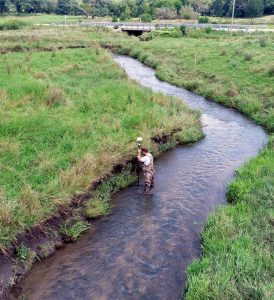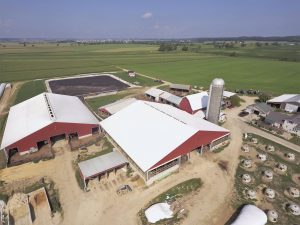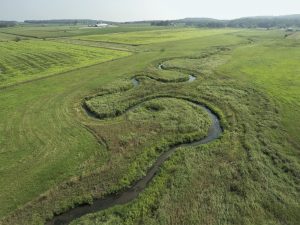The Brodhead Water Quality Trading program began as a wastewater project in a small Wisconsin community of 3,276 struggling to meet new stringent water quality based effluent limits (WQBELs) for phosphorus. When the new limits were released in 2010 and the City of Brodhead’s Wisconsin Pollutant Discharge Elimination System (WPDES) permit reissued in 2012, community leaders knew they were up against a compliance challenge.

The City owns and operates a treatment plant in sound working condition, yet it would take a whopping $4.2 million to overhaul the facility to meet the required future effluent limits for phosphorus as set forth by the WPDES permit: a target of 0.1 mg/L. In the end, this investment would only fix .5% of the problem. MSA engineers recognized that a traditional structural upgrade was not the answer, nor was mere compliance the ultimate goal. Rather, a reduction in total phosphorus means protecting the integrity of the local watershed, so why settle for simply meeting the prescribed effluent limit when a project can make a larger and lasting impact?
MSA engineers worked in close concert with the City to examine all phosphorus-reducing alternatives and settled on the creation of a Water Quality Trading Program. The program is unconventional in that it fuses wastewater, agricultural and water resources engineering, with key stakeholders being local landowners and farmers who all hold equal accountability in a successful outcome. To achieve the WQBEL goals, MSA and the City of Brodhead embarked upon a methodical study of all area sub-watersheds. After identifying Searles Creek as the most impactful location to begin, engineers stabilized 62 severely eroding streambanks along two properties adjacent to Searles Creek, a Wisconsin DNR-designated 303d impaired stream and major contributor of sediment loads impacting the watershed.

They also collaborated with a local farmer to modernize manure systems and nutrient management practices including the design of a new, 2.2-million-gallon manure storage tank, waste transfer channels, clean water diversions, and development of a nutrient management plan, essentially eliminating offsite runoff from the farm’s animal production area.
Together, the WQT program reduces the municipality’s total phosphorus load by 1,090 pounds per year as opposed to approximately 190 pounds per year that would have been achieved through the costly treatment facility upgrade — more than five times the requisite phosphorus reductions. It also generates 390 annual pounds of WQT credits to meet current and future compliance goals. Most importantly, it upholds water quality and vastly minimizes harmful phosphorus loads entering the Sugar River watershed.
The total capital investment of the Water Quality Trading Program for the City of Brodhead is just $932,256, saving the community approximately $3.8 million in lifecycle costs. This project proves that innovative thinking and a collective, sustainable approach is not only the best solution for phosphorus compliance, but also the best protection for the integrity of Brodhead’s natural resources.

MSA was chosen to receive the 2022 Grand Award from the American Council of Engineering Companies (ACEC) of Wisconsin for this project — the top honor selected from a group of 2022 Engineering Excellence Best of State Award winners. The Grand Award is given to a singular project from all 2022 award entries that demonstrates the highest degree of engineering achievement, skill and creativity in the state of Wisconsin.
Best of State recipients advanced to the ACEC National competition, where this project was presented with an ACEC National Honor Award — a prestigious distinction and representation of exceptional engineering achievements. Award winners were formally honored at the 2022 Engineering Excellence Awards Gala May 24, 2022, in Washington, D.C. as part of the ACEC Annual Convention.
